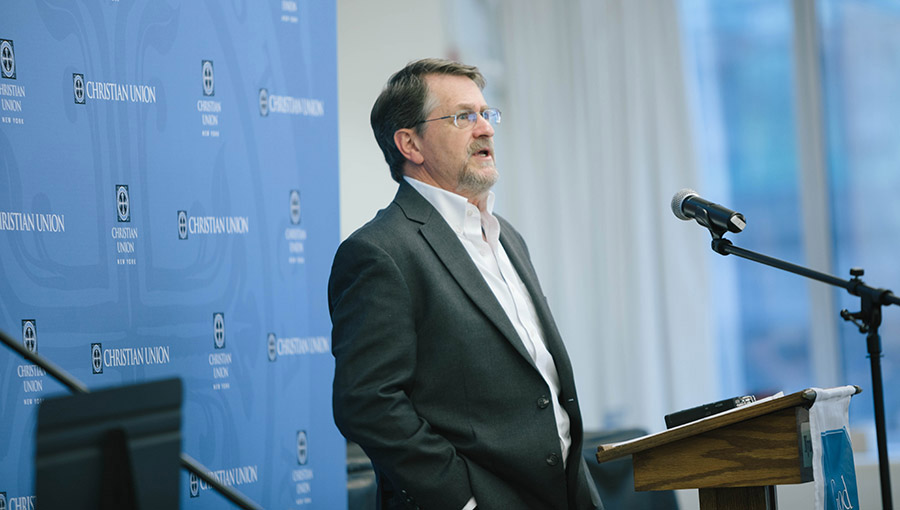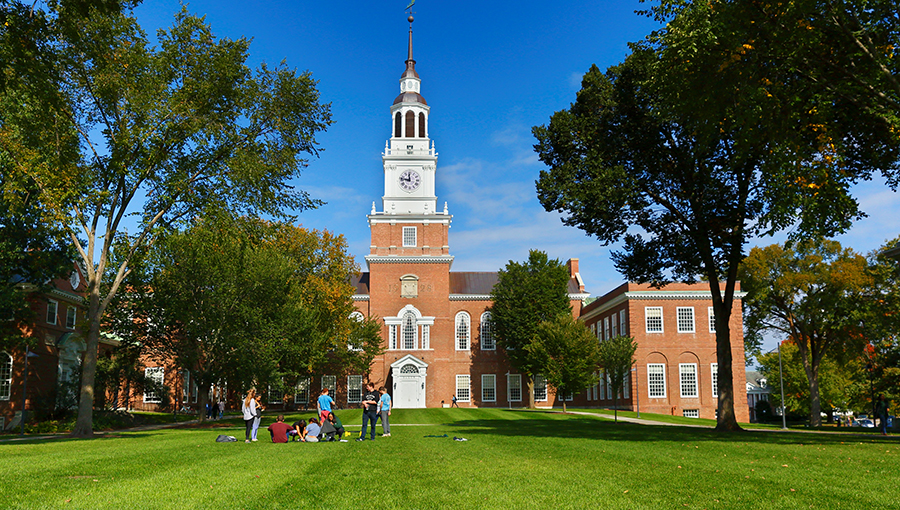Prayer, Revival, and Societal Transformations
At Christian Union’s Cities Conference in Manhattan in 2018, George Otis, Jr. talked about the first Great Awakenings in the United States and the ensuing socioeconomical impact that followed in various cities and communities that were “overwhelmed by the grace and presence of God.”

Christian Union: The Magazine interviewed Otis regarding the role of individual and corporate prayer in these outpourings. He is the founder and president of The Sentinel Group, a U.S.-based Christian research, media, and training agency “dedicated to helping revival-hungry communities discover the pathway to societal transformation.” Best known as the producer of the award-winning “Transformation” documentaries − a series that has been viewed by an estimated 250 million people in 175 nations − Otis has also authored six books and is a frequent speaker at international conferences and symposia.
In 2004, the researcher founded the International Fellowship of Transformation Partners (IFTP), a global coalition of ministries that serves the cause of transforming revival. The IFTP is the primary distribution vehicle for the Journey to Transformation training process, which aids communities eager to prepare for spiritual awakening. The principle-based training is a distillation of research conducted over a 15-year period.
Otis has previously served in leadership capacities with Youth With A Mission, the Lausanne Committee for World Evangelization, and the AD 2000 & Beyond Movement. He has also been engaged as an advisor to The Call, Aglow International, Ellel Ministries, Intercessors for America, and numerous other organizations.
In addition to his duties at the Sentinel Group, Otis presently teaches at the Forerunner Media Institute associated with the International House of Prayer in Kansas City.
Christian Union: In your research over the years, what have you learned about the relationship between prayer and revival and prayer and transformation?
George Otis: Growing up, I had the impression that prayer was a distinctly personal exercise. It was what one did when wrestling with especially important life questions or seeking forgiveness for some transgression. Taking petitions into the public arena was more difficult to translate. Like a lot of men my age, I struggled to see how something so abstract and intangible could be an effective means of addressing the hard reality of social dysfunction. How does one even measure results? Better to say a little prayer and get on with the more practical business of raising money and assembling a coalition.
Regrettably, I came to the prayer movement not through faith, but through research. For nearly a quarter century, God, in his kindness, allowed me to witness his transformational handiwork in literally hundreds of international communities. As I scrutinized these breathtaking stories, I found, somewhat to my surprise, that prayer was a pronounced and common thread. Not merely in some of the accounts, but in all of them! And the pattern held when I took time to investigate historical revivals over the past 450 years. The inescapable conclusion was that transforming revival is the inevitable consequence of fervent, united, and prevailing prayer.
CU: How did a commitment to fervent prayer by individuals or communities help sustain previous moves of God?
GO: It is difficult to avoid at least a mention of the Moravians whose commitment to fervent daily prayer lasted well over a century and fueled both the modern missions’ movement and 24/7 prayer efforts throughout the world. Many words have been written about their remarkable dedication, but the thing that continues to impress me is the choice to involve their children in prayer. Indeed, the longevity of the Moravian experience has much to do with the fact that two generations carried the revival torch.
Although the anointed preaching of revivalists like John Wesley, George Whitfield, Charles Finney, and Duncan Campbell (Hebrides Revival) brought thousands to faith in Christ, it is worth noting these men spent hours in prayer before and during their campaigns. They were also accompanied by powerful intercessors like Daniel Nash (with Finney in New York) and Hector McKinnon (with Duncan Campbell on Berneray), whose commitment to prevailing prayer was such they actually died on their knees. During the entire length of Finney’s remarkable revival in Rochester (1830-1831), Abel Clary prayed day and night, prostrate on the floor. And as Finney reports, “I knew at the time a considerable number of men who were exercised in the same way.”
CU: What are some examples of communities/cities worldwide that are seeking God in a profound way and may be on the brink of a breakthrough?
GO: There are a number of areas today where effective transformational prayer is on display. At the top of the list is Melanesia, a vast territory in the Western South Pacific that includes Fiji, the Solomon Islands, Vanuatu, and Papua New Guinea. From the early 2000s, scores of communities throughout this region have witnessed extraordinary and highly contagious moves of God. Now the fire is moving into Aboriginal Australia.
Similar breakthroughs are taking place in parts of Brazil, Colombia, Indonesia, the Canadian Arctic, Rwanda, Nepal, and elsewhere. While space does not permit me to go into detail, the spiritual hunger in these areas has given way to some very compelling fruit. Fervent prayer is also preparing the way for revival in various parts of China, Thailand, Iran, Jamaica, Algeria, India, and South Africa. And children, as they did with the Moravians, are playing no small part. Even in post-Christian Europe, God is moving to restore the spirit of revival that once shook the continent. Leading the way are powerful prayer movements in Wales (Ffald-y-Brenin Retreat Center), Northern Ireland (Nutts Corner Markets), Scandinavia, France, Holland (Rotterdam), Germany, Macedonia, and the multi-nation Boiler Room network for 24/7 prayer.
CU: Do you see any signs of a revival or another Great Awakening in the United States? If so, why are you hopeful? If not, what will it take to turn it around?
GO: Although a number of Christian voices have either called for or prophesied a fresh great awakening in America, I just don’t see it. Not now, and not tomorrow. I realize this will likely ruffle some feathers and open me up to charges of being a faithless pessimist, but I think most people will calm down once they hear me out.
For starters, I am not saying America will not see revival in the coming days — indeed I can take you to several places where it is taking place right now. But these current and future awakenings are better characterized as localized “oases of grace” rather than sweeping national revival (presumably originating in Washington, DC). In some places, these local revivals may well coalesce into regional conflagrations. And I definitely suspect we will see more of these breakthroughs as the days continue to darken. Darkness begets desperation, and when people are shorn of their strength the conditions are ripe for deliverance.
America has become a spectacle among the nations in a manner reminiscent of Israel’s days of wandering and judgment. As we sink into deeper confusion, coarser incivility, and rationalized indulgence, who is to say we have not already crossed a divine “red line”? I may be wrong, but with every passing day I find it easier to imagine my own nation in the angel’s fateful cry in Revelation 18. This is not easy to hear. With our godly roots, and with mission laborers and resources still flowing from our shores, there is an inclination to think − or at least hope − these words might be descriptive of another place or time. But we cannot afford to live in our rationalizations.
Most concerning in this critical hour is our seeming inability to rise above comfort orientation, relentless distraction, and an instinctual reliance on programs—all of which war against our stated goal of spiritual awakening. It seems we are willing to prepare the way of the Lord so long as we don’t have to break stride. But the very nature of revival precludes it from being welcomed by a people at leisure. If there is one cause for optimism in our broken society that singer-songwriter Bob Dylan once called “Desolation Row,” it is that believers are starting to question their responsibilities with renewed urgency.
CU: What are a couple of your favorite scriptures that speak of the need for prayer when it comes to revival?
GO: There are so many! The explicitness of 2 Chronicles 7:14 is hard to ignore, but this familiar verse has plenty of company when it comes to passages linking prayer with revival. We can start with Matthew 6 where Jesus instructed his disciples to pray that God’s kingdom would be manifest on earth as it is in heaven. In other words, we don’t need to coexist with dysfunctional human systems when we have been given license to petition the Father for a heavenly upgrade! In this same vein, Ezekiel 36 uses vivid transformational language in describing God’s desire to shower his people with deliverance and prosperity if they will but ask. “I will also let the house of Israel inquire of Me to do this for them,” He says in verse 37. “I will yield to Israel’s plea” (NIV).
Another passage that springs to mind is Isaiah 62:6-7. Here God invites his people to petition for change, and then admonishes them to pray until they prevail. “You who call on the lord, give yourselves no rest, and give him no rest till he establishes Jerusalem and makes her the praise of the earth.” Hosea likewise speaks of pressing into God and promises a certain response to those who do. “Let us acknowledge the lord; let us press on to acknowledge him. As surely as the sun rises, he will appear; he will come to us like the spring rains that water the earth.”
To learn more about Christian Union’s passion to see national revival and its ministry at some of the nation’s most influential universities, please click here.



